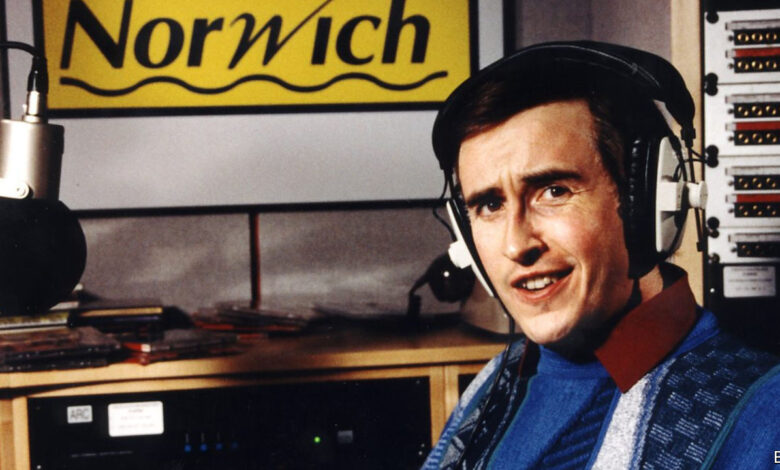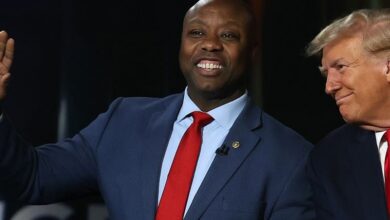On Brexit films, Brexit books and Brexit television

I RECENTLY spent a happy few days in Los Angeles promoting my new book, “Capitalism in America: A History” (co-written with Alan Greenspan). I was driving down Hollywood Boulevard in a taxi thinking that all was right with the world—the sun was shining, the people were good-looking and, above all, I wasn’t on deadline to write something about Brexit—when I caught sight of a giant red billboard bearing a single word in huge letters: BREXIT.
Worried that I’d finally gone mad—and it can only be a matter of time given both the pace and content of political news in Britain—I asked my taxi driver if I was seeing things. He assured me that the sign was in fact there and that it was advertising the new Benedict Cumberbatch film which was called “An Uncivil War” but is simply being called “Brexit” in the United States. I asked him what Brexit meant to him—interviewing taxi drivers is what foreign correspondents call “research”—and he gave me a remarkably well-informed summary of the whole sad tale. Few lobby correspondents could have done better.
He told me that he had been born in Nigeria and had studied political science at university before emigrating to the United States. His great passion was studying political failures. He’d even produced a ranking of disastrous political decisions and disastrous political leaders. Brexit was currently number one on the first list and David Cameron on the second. I quibbled that this might be going a bit far—Britain couldn’t be compared with Venezuela or David Cameron with Nicolás Maduro—but he said it was all a matter of trajectory. Given where Britain was just a few years ago it had fallen far farther than anywhere else.
****
THE BEST thing I’ve read on Brexit recently is Sir Ivan Rogers’s short book (appropriately enough published by Short Books), “Nine Lessons in Brexit”. Sir Ivan has got a good claim to being the first person to predict just how big a disaster this was all going to be. He was Britain’s Permanent Representative to the European Union (having previously been David Cameron’s key man on Europe) when he resigned in frustration over Number 10’s refusal to take seriously enough his warnings about how difficult Brexit was going to be. I won’t rehearse his nine lessons but will just pick up a few random points that struck me as I read. (1) The WTO argument is built on a logical contradiction: you can’t both argue that Britain will be fine to revert to WTO terms and that the big advantage of Brexit will be that it will allow us to negotiate our own trade deals on something other than WTO terms. (2) The EU is a regulatory superpower that has concentrated just as much on forging rules that govern flows of information as flows of goods. Britain has no choice but to pay attention to these rules but will lose any chance to influence them when it leaves the EU. Far from taking back control it will be giving up control. This is particularly damaging for a service economy that is based increasingly on the flow of information rather than goods. (3) We haven’t seen anything yet: even if we can get past Brexit day on March 29th without Theresa May’s deal exploding and the government collapsing, the most difficult phase of the negotiations with the EU is still to come. Brexit will be at the heart of our politics for years to come.
Sir Ivan thinks that the chances of Britain leaving without a deal are higher than conventional wisdom holds. I’m sure he’s right that they’re high, but not right about conventional wisdom: I get the sense that more and more people are coming to the conclusion that a crash out is pretty likely. I’ve heard two very well-placed parliamentary sources putting it at about 60%. The European Research Group—a collection of Brexit-supporting Tory MPs, and perhaps the world’s most misnamed organisation since it has never done any research—is trying to normalise a no-deal Brexit. Theresa May is more interested in holding the Conservative Party together than she is in doing the right thing for the country. She’s a reverse Robert Peel who sees everything through the prism of party politics. And the Europeans are in danger of concluding that the situation is becoming impossible.
****
I HAVE no doubt that Brexit will lower Britain’s potential growth rate for the near future. But in my more cynical moments I wonder if this might play to one of our great national advantages. It was an American, Henry David Thoreau, who said that “the mass of men live lives of quiet desperation”. But Thoreau’s countrymen are in fact useless at quiet desperation—they specialise in either noisy success or noisy failure. My recent trip to Los Angeles revealed a society more divided than ever between the super-rich celebrating their success in the hills and the homeless raging in the streets of downtown. The British, on the other hand, are very good at reconciling themselves to decline and marginalisation—indeed quite a number of Britons positively relish it.
British comedy specialises in producing studies of entertaining failures. David Brent (of “The Office”) is a ludicrously bad manager who thinks that he’s god’s gift to entertainment as well as business. He starts off in a dismal position—running an office in one of Britain’s most boring towns—and then proceeds to fall ever downwards. Alan Partridge (pictured) is a DJ on Radio Norwich working the early-morning shift and delivering impromptu lectures on the evils of modern farming, to an audience that, because of the early hour, consists mostly of farmers. He lives in a Travel Tavern and contents himself with minor victories over the system such as eating as much as he can at the breakfast buffet. And Basil Fawlty (“Fawlty Towers”) is perhaps the world’s most unsuccessful hotel owner.
The British relish these figures not just because they want to mock the afflicted but because they see their own lives reflected in their anti-heroes. Vast numbers of Britons work in offices run by useless bosses (research by two heavyweight economists, John van Reneen and Nicholas Bloom, shows that one of the reasons for Britain’s “productivity puzzle” is that the country has a long tail of poorly managed companies). Norwich is much closer to the heart of the country than Westminster. Everybody has experienced a Fawlty Towers-style hotel or restaurant. I suspect that we also laugh because we admire the way that our anti-heroes put a brave face on it and just get on with their lives despite the fact that they’re so horrific.
The greatest poet of the post-war era was also a poet of failure. Philip Larkin positively relished decline and marginalisation. He lived an unglamorous life in Hull (where he was university librarian) while his great friend Kingsley Amis enjoyed the high-life. He liked to think of every solution as a potential problem and every blessing as a disaster in disguise. I remember seeing him in All Souls in the 1980s (where he was a former visiting fellow) and being enormously impressed by his overwhelming negativity. His greatest poems like “Mr Bleaney” dealt with people living empty lives in out-of-the-way places, with happiness and fulfilment either a distant memory or an irrelevant dream.
Margaret Thatcher was in many ways a very un-British Briton. She loathed the establishment’s embrace of “managed decline” and tried to inject a spirit of American can-doism into the body politic. But it never really took: the managers she unleashed on “UK plc” were little David Brents and, even as the City boomed, the Britain of Basil Fawlty and Mr Bleaney entrenched itself in the provinces. Britain is well-prepared for its future!
****
PERHAPS THAT’S enough self-indulgent gloom for one morning. One of the many striking things about the 12 (and counting) MPs who have quit their parties this week is that they’ve introduced a bit of optimism into British politics. They’ve all agonised about leaving the parties that they’ve devoted many years of their lives to. Most of them are probably worried about their future. But they also look happy and relieved. Relieved that they no longer have to be slaves to party machines that they have grown to hate. Happy that they may be part of something better.
The MP who has made the best job of conveying the optimism of this moment is Heidi Allen. I must confess that I’ve never really thought about Ms Allen before. This is no doubt partly because of laziness on my part but also because the Conservative Party has done far too little to reward her talent. Mrs May will obviously be remembered primarily for her disastrous handling of Brexit. But she should also be remembered as one of the most dismal party managers the Conservatives have had (for all his failures David Cameron was a first-rate party manager). She’s kept the dismal failure that is Chris Grayling in the cabinet throughout her time in Downing Street. She’s promoted the absurdity that is Gavin Williamson to one of the most senior jobs in government, defence secretary. She moved Rory Stewart sideways from the Foreign Office to prisons (he would have been a superb replacement for Boris Johnson). And she’s left lots of talented people treading water in the party’s middle-ranks or, like Ms Allen, overlooked on the backbenches.


